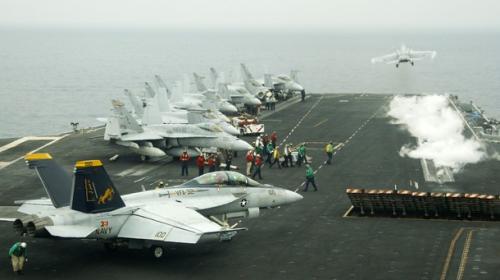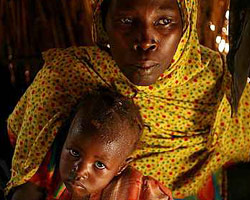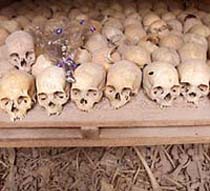I’ve always believed that in the wake of the Holocaust, the popular Jewish imperative “Never Again” shouldn’t just apply exclusively to Jews, but to all peoples everywhere. While it might come out of our particular experience, it must be considered a universal imperative. Since we Jews know first hand about such things, never again can we remain silent when any people’s existence is threatened by murderous regimes.
To be completely fair, however, it’s easy enough to determine to not stand idly by in the face of government-sponsored brutality – but it’s quite another to determine what in fact should be done. Our current military operations in Libya provide the perfect case in point.
Among the many pieces I’ve read on these horrible developments, I was interested to learn that Ban Ki-Moon had in fact invoked “Never Again” while discussing Libya during a recent tour of the US Holocaust Museum. And it was extremely significant to me to learn that National Security Advisor Samantha Powers – an eloquent voice of conscience on the subject of genocide – was among those who urged Obama to support military action against the Kadaffi regime.
However, while I do indeed believe in “Never Again,” and while it has been increasingly agonizing to read the tragic reports coming out of Libya, I must reluctantly admit I do not support our military operations there.
First, and probably foremost, whatever is happening in Libya, it is not close to the scale of a genocide. If that sounds overly crass, it is worth asking why we are eager to engage militarily with Libya yet have chosen not to act on behalf of Cote D’Ivoire, Sudan, the Democratic Republic of Congo, or any number of other countries whose governments are committing atrocities that are no less brutal than Kadaffi’s (and in some cases more so.)
On this point, Israeli journalist Yael Lavie comes to a fairly blunt conclusion:
Call me a cynic, call me a product of the Middle East or better yet a citizen of this region who witnessed the outcome of western intervention over the course of the last 20 years – but the war that has just begun is not just. It is not being waged to stop the Libyan people from being killed. If that were the case we can name many ongoing genocides around the world, such as the decade long holocaust in the Sudan, where no western UN resolution motivated military action has ever been taken and ask why now?
As it stands right now we may be facing another attempt by the west for enforcing regime change in the Middle East with the usual western personal agenda – the agenda of oil. There is one thing recent history has proven to us time and time again – Where there is no oil, there is no intervention.
Even if one doesn’t share Lavie’s level of cynicism, we’d do well to ask whether or not it’s our place to engage militarily with every oppressive regime around the world. Especially given our recent history of military regime change with Muslim nations, our operations in Libya might at least give us cause for concern.
As for me, I believe it is profoundly ill-advised for our country to pursue yet another war against an Arab country. While it is true that the Arab League voted to back a no-fly zone, that support is already waning now that air strikes are killing Libyan civilians. Make no mistake: we are now waging war in Libya.
Rep. Dennis Kucinich, as usual, hit this point right on the head on the eve of the UN Security Council vote:
While the action is billed as protecting the civilians of Libya, a no-fly-zone begins with an attack on the air defenses of Libya and Qaddafi forces. It is an act of war. The president made statements which attempt to minimize U.S. action, but U.S. planes may drop U.S. bombs and U.S. missiles may be involved in striking another sovereign nation. War from the air is still war…
The last thing we need is to be embroiled in yet another intervention in another Muslim country. The American people have had enough. First it was Afghanistan, then Iraq. Then bombs began to fall in Pakistan, then Yemen, and soon it seems bombs could be falling in Libya. Our nation simply cannot afford another war, economically, diplomatically or spiritually.
None of this is meant to diminish the sacrosanct imperative of “Never Again.” But beyond the moral absolutes there are difficult and painful questions we must face when confronted with human rights abusing nations: when should we deem it necessary to authorize the use of military force? Why are we compelled to act in some cases but not others? To what extent are our decisions motivated less by need than by national self-interest?
I’ll give the final word to a recent Nation editorial:
(There) is a worrying dimension to this intervention, in that it reflects a mindset that associates US foreign policy, whether alone or as part of an allied force, with heroic crusades to bring down the bad guys. But it is exactly that mindset that has done so much damage in the Middle East over the years and that has saddled us with the costly burdens of two ongoing wars in Muslim lands. And Washington’s support for military action in Libya, on avowedly humanitarian grounds, should call into question ever more sharply the cynical American acquiescence in brutal suppression of peaceful demonstrations in Bahrain.
The democratic awakening in the Arab world presents the United States with an opportunity to put that past behind us. It offers us a chance to align our interests with democratic change and economic progress. It would be a tragedy if we allowed the intervention in Libya to distract us from these difficult and important challenges. We need to deal with longstanding allies like Jordan, Bahrain and Saudi Arabia—which continue to resist democratic reforms—and to help the Egyptian people consolidate democracy and create jobs and economic opportunity. The most productive role for America in the Middle East today is diplomatic and economic, not military.



 “This shall be to you a law for all time: to make expiation for the Israelites for all their sins once a year.” — Leviticus 16:34
“This shall be to you a law for all time: to make expiation for the Israelites for all their sins once a year.” — Leviticus 16:34 Shema
Shema  What Would You Do?
What Would You Do? This Saturday, JRC will commemorate Yom Hashoah (Holocaust Remembrance Day) with a memorial service for the victims of the Shoah, followed by a presentation from a survivor of a more recent genocide.
This Saturday, JRC will commemorate Yom Hashoah (Holocaust Remembrance Day) with a memorial service for the victims of the Shoah, followed by a presentation from a survivor of a more recent genocide. Each genocide is different, but it would be a mistake to dismiss the similarities. Foremost among them is the suffering of the victims. There is no better or worse genocide, just as there is no better or worse murder, no better or worse torture. There is no scale to measure suffering. Jews, Armenians or Poles who were martyred and murdered all suffered the same.
Each genocide is different, but it would be a mistake to dismiss the similarities. Foremost among them is the suffering of the victims. There is no better or worse genocide, just as there is no better or worse murder, no better or worse torture. There is no scale to measure suffering. Jews, Armenians or Poles who were martyred and murdered all suffered the same.